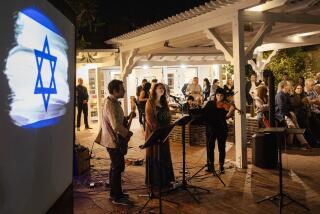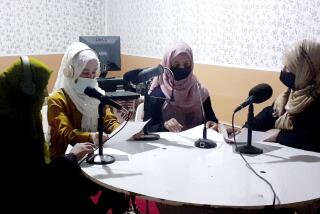Locally Based Radio Program Serves Afghan Community
- Share via
The pouches under Omar Khatab’s puffy eyes are from pure fatigue. His voice is weak, his speech slow.
Twenty minutes is all he needs. Time for meditation and quiet, time to close his eyes.
Then, he says, as if willing it so, “I’ll be fine.”
Khatab, 46, runs one of the country’s longest-running Afghan radio programs. Operating out of studios in Orange and Canoga Park, he buys time on the airwaves in Southern California, Toronto and Washington, D.C., for his weekly show, Radio Payame Afghan. In Northern California, home to the nation’s largest Afghan emigre community, he broadcasts around the clock.
Radio Payame Afghan fills a media void--offering commentary, news and call-in talk shows for a community with limited access to broadcasts in Afghan languages such as Pashto and Persian. He numbers his potential listening audience at more than 150,000 in North America.
Most listeners still have strong family ties to the country. Although Afghanistan hovered in the news for decades with its struggle against Soviet occupation and its civil war, the country now faces perhaps its greatest threat: military strikes by the United States for providing refuge to terrorist leader Osama bin Laden.
Like many in his audience, Khatab--raised to be loyal to the monarchy that once ruled the country--has mixed feelings about the current regime. As a Muslim, he says he at first supported the fundamentalist Taliban government.
“People in Afghanistan rallied around them,” he says. “They were very good in the beginning. They brought peace. They brought security.”
But the Taliban leaders were young and inexperienced, and in part because of the radicalizing influence of Bin Laden, they have gone too far, he says. He regards Bin Laden as an uninvited guest who has put his country in great danger.
The United States--which supported the Taliban initially in its fight against Soviet invaders--must share some of the blame for the current state of affairs for withdrawing that support when it was most needed, he says.
Afghan refugees in the United States are drawn from a wide political spectrum--from supporters of the Northern Alliance, which is fighting the Taliban, to those who back the current government. To serve this diverse audience, Khatab’s radio programs focus on providing neutral news accounts and information that all can use, he says.
“My role is first to inform them of the truth, to shed light on what’s going on in Afghanistan and in the United States,” Khatab says. “Mentally and psychologically, people are worried. They are shaken. They are shocked. . . . It is a big burden, and doing it on a 24-hour basis is not an easy job.”
He airs native-language broadcasts by the BBC and Voice of America. He also programs music and cooking shows, as well as call-in talk shows about everything from the Taliban to how to get into college.
Although Khatab says callers to his radio shows have all decried the terrorist attacks on the East Coast, some have echoed the Taliban in demanding that the United States not retaliate against Afghanistan without proof that Bin Laden is responsible.
Radio listener and volunteer Walid Farooqi, 21, of Canoga Park said Khatab’s strategy of providing neutral news has been successful.
“People that don’t understand what’s on television can listen. And it has other things that the regular American programming and news don’t cover. . . . It brings people together.”
Throughout Southern California, numerous ethnic radio programs and publications cater to everyone from Vietnamese to Central Americans. Sandra Ball-Rokeach, a professor at USC’s Annenberg School for Communication, calls them “mini-media” that help immigrant populations maintain their identity and connect with their home countries.
“It’s an essential information resource--all the way from huge cultural identity things to everyday coping,” she said. But, she added, “under a situation like this, it becomes critical.”
Since Sept. 11, His Workdays Are Longer
For nine years, Khatab has kept the operation afloat through advertising and money from his other businesses, which include small auto-repair and parking operations. He relies on unpaid disc jockeys and talk-show hosts, and devotes hours of his own time--acting as ad salesman, station manager and news director all rolled into one.
For these reasons, it’s always an exhausting job. But since Sept. 11, the workdays have stretched longer even as his personal anxiety has increased--both about what may happen to Afghanistan and the backlash many immigrants are feeling here.
Married with two children and living in Anaheim Hills, Khatab works out of an office in his Orange studio that is a strange mix of his two countries, America and Afghanistan. Arabic calligraphy quoting passages from the Koran hangs on his wall. “The Happily Ever After Handbook” and a supply of motivational books on tape, such as “Swim With the Sharks,” sit on his shelves.
It is a small window into Khatab’s life, a journey that led this son of an Afghanistan governor to the United States in 1978 in pursuit of advanced degrees in economics.
When he left Afghanistan, the then-23-year-old already had almost eight years of experience as a newscaster for the government-run radio station. It was a hobby he picked up because people told him he had a clear, deep voice. With a bachelor’s degree and his six-month stint for the Afghanistan military under his belt, he intended to study in the United States, then go back to Kabul University as an economics professor.
But shortly after he arrived in Southern California, the Soviet Union invaded Afghanistan, sending the country into a tailspin that continues today. He has never returned home.
Convinced that he would not be able to return to teach in Afghanistan, he gave up his economics career and pursued other work in the United States. Along the way, he determined to revive his radio hobby. He purchased air time, starting with just an hour a week on a local station. As demand and interest grew, so did his commitment.
He gives his listeners an outlet to air their opinions among an audience of peers and provides them with on-the-spot reports from a journalist stationed in Pakistan.
“Sometimes I think, ‘Why am I doing it?’ ” Khatab says. “It’s too much work. It’s a hardship. It is not profitable. . . . But there is a force behind it. It is a public service.”
Now, Khatab sees a bigger role as he pushes for the United States to be patient with Afghanistan, reminding Americans that his homeland is already destitute and war-torn.
“People who are living there are innocent,” he says. “They have no food. They don’t have even water. They have primitive homes. . . . We don’t want the country to be destroyed because of Osama bin Laden.”
More to Read
Sign up for Essential California
The most important California stories and recommendations in your inbox every morning.
You may occasionally receive promotional content from the Los Angeles Times.











